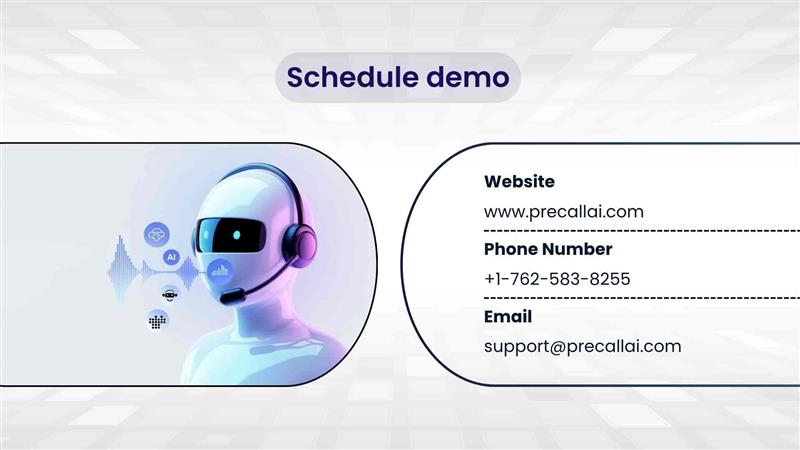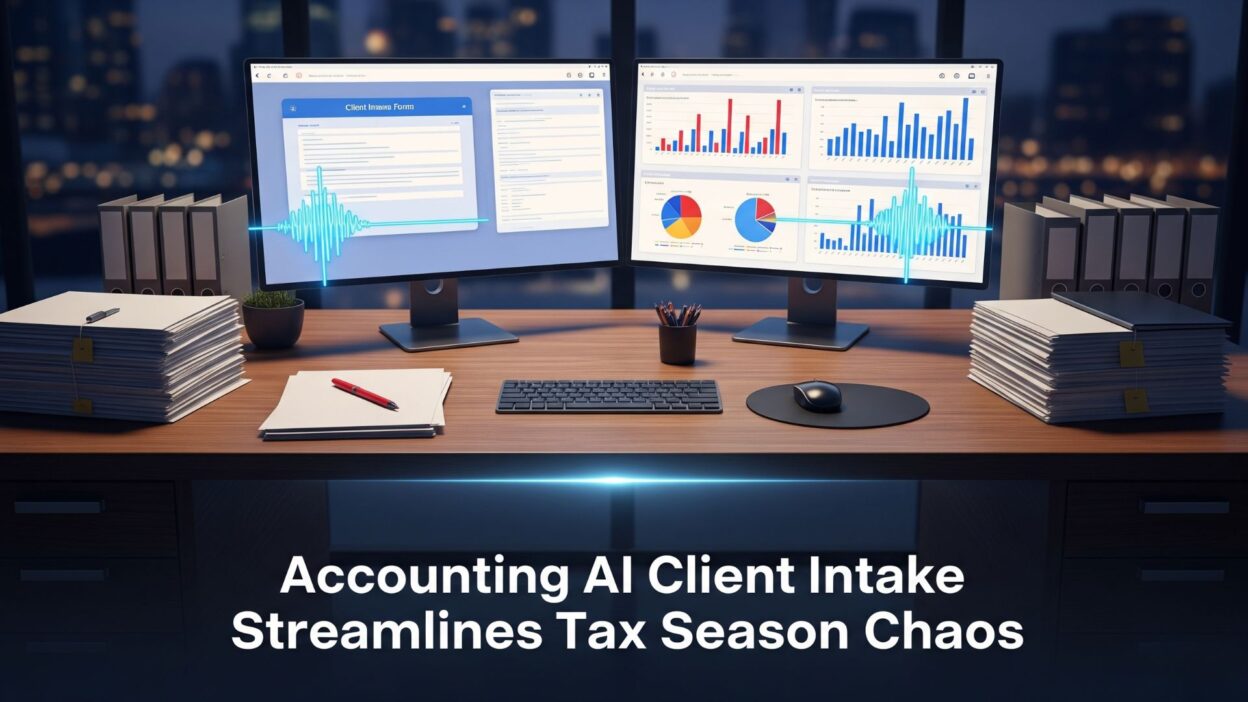TL;DR Accounting AI intake revolutionizes client onboarding during peak tax preparation periods. CPA firms eliminate administrative bottlenecks using intelligent voice technology systems. CPA AI calls handle new client screening 24/7 without human intervention. Voice-powered intake systems reduce staff workload while improving client satisfaction rates significantly.
Table of Contents
What is Accounting AI Intake?
Accounting AI intake uses artificial intelligence technology to automate client onboarding processes during tax season. Voice recognition systems collect essential client information automatically through phone conversations. Machine learning algorithms categorize client data based on tax preparation complexity levels. CPA AI calls integrate seamlessly with existing practice management software platforms.
Smart intake systems analyze client responses to determine service requirements instantly. Automated voice assistants schedule appointments based on preparer availability calendars. AI technology reduces manual data entry while improving information accuracy rates. Accounting firms handle higher client volumes without increasing administrative staff costs.
Can AI Replace Tax Preparers?
Artificial intelligence automates routine client intake tasks effectively during busy tax seasons. Voice technology handles initial client screening plus document collection processes automatically. CPA AI calls collect basic taxpayer information while identifying complex preparation requirements. Smart systems route clients to appropriate tax professionals based on return complexity.
Tax preparation requires human expertise for complex situations involving multiple income sources. Professional judgment remains essential for unusual deductions plus tax planning strategies. Accounting AI intake enhances preparer efficiency rather than replacing professional tax knowledge. CPAs focus on high-value advisory services while AI handles routine administrative tasks.
Benefits of AI Client Intake
1) Increased Efficiency and Productivity
Voice automation processes new client applications within minutes instead of hours traditionally required. Accounting AI intake eliminates phone tag between staff plus prospective clients completely. Administrative teams focus on complex client service tasks while AI handles routine inquiries. CPA firms process double the client volume without hiring additional intake personnel.
Smart scheduling systems coordinate client appointments automatically based on preparer specializations. Voice technology updates client information across multiple software platforms simultaneously. Tax season productivity increases dramatically through automated intake workflow management. Professional staff dedicate time to revenue-generating activities rather than administrative paperwork.
2) Automated Tasks and Reduced Human Error
Manual client intake contains data entry mistakes frequently during high-volume tax seasons. Voice recognition technology eliminates transcription errors through automated information processing. Accounting AI intake verifies client responses against database requirements automatically. Smart systems flag incomplete applications before they reach tax preparation staff.
Traditional intake methods miss critical client information due to human oversight limitations. AI voice assistants ask comprehensive questions systematically without skipping essential details. CPA AI calls ensure consistent information collection across all new client interactions. Automated verification processes reduce preparation delays caused by missing documentation.
3) Improved Customer Experience
Clients access intake services 24/7 without waiting for business hours availability. Voice technology provides immediate responses to basic tax preparation questions instantly. Accounting firms offer convenient scheduling options through automated appointment booking systems. CPA AI calls reduce client frustration during peak tax season communication periods.
Smart intake systems remember client preferences from previous tax season interactions automatically. Voice assistants guide clients through document preparation requirements step-by-step clearly. AI technology sends automated reminders about missing forms plus deadline notifications. Client satisfaction improves through streamlined onboarding experiences during stressful tax periods.
4) Enhanced Data Analysis and Predictions
AI algorithms analyze client intake patterns to predict seasonal workforce requirements accurately. Smart systems identify peak demand periods for optimal staff scheduling decisions. Accounting AI intake generates reports showing client service trends across multiple tax seasons. Voice technology tracks common client questions for FAQ development plus training purposes.
Historical intake data helps CPA firms optimize marketing campaigns for specific client demographics. AI systems predict client retention rates based on initial intake interaction quality. Smart analytics identify profitable client segments for targeted business development efforts. Voice data analysis reveals opportunities for service expansion plus pricing optimization.
5) Generate More Accounting Leads
Voice intake systems capture contact information from prospects exploring tax services. AI technology qualifies leads automatically based on service requirements plus budget parameters. Accounting AI intake nurtures potential clients through automated follow-up communication sequences. Smart systems track conversion rates from initial inquiry to signed engagement letters.
CPA AI calls identify referral opportunities during client intake conversations automatically. Voice assistants collect testimonial requests from satisfied clients for marketing purposes. AI systems generate personalized service recommendations based on client tax situations. Automated lead scoring helps prioritize follow-up efforts for maximum conversion success.
6) Cost Savings
Voice automation eliminates overtime costs during peak tax season administrative periods. Accounting firms reduce temporary staffing expenses through AI-powered intake efficiency. CPA AI calls handle after-hours inquiries without additional personnel costs. Smart systems minimize paper processing expenses through digital document management.
AI technology reduces phone system costs by handling multiple client calls simultaneously. Automated appointment scheduling eliminates double-booking plus missed appointment expenses. Accounting AI intake decreases marketing costs through improved lead conversion rates. Staff productivity gains translate directly into higher profitability per client engagement.
7) Creation of New Job Opportunities
AI implementation requires technical specialists for system integration plus maintenance activities. CPA firms hire client experience managers to oversee voice technology interactions. Accounting AI intake creates demand for data analysts specializing in client behavior patterns. Smart system deployment generates consulting opportunities for AI implementation experts.
Voice technology support roles emerge as firms expand AI capabilities across service offerings. CPA practices develop internal AI training programs for staff skill development. New business models emerge combining traditional accounting with AI-powered client services. Technology partnerships create revenue opportunities through AI system licensing plus support.
8) Improved Quality of Life Through Automation of Repetitive Tasks
Tax season stress decreases significantly when AI handles routine client intake responsibilities. Accounting staff work regular hours instead of extended overtime during peak periods. CPA AI calls eliminate weekend work requirements for basic client service tasks. Professional teams focus on meaningful client advisory work rather than administrative duties.
Work-life balance improves dramatically through automated workflow management during tax season. Staff burnout reduces when AI technology handles high-volume repetitive tasks efficiently. Accounting AI intake allows professionals to maintain client quality while managing larger practices. Job satisfaction increases when teams engage in strategic work rather than data entry.
AI Client Intake Challenges
Technology implementation requires significant upfront investment in software plus staff training costs. Client acceptance varies across demographic groups preferring human interaction over voice technology. CPA AI calls need reliable internet connectivity for optimal voice recognition performance. Data security concerns require comprehensive protection protocols for sensitive taxpayer information.
Staff resistance to AI adoption can slow implementation timelines across accounting practices. Voice technology accuracy depends on client English proficiency plus speaking clarity levels. Accounting AI intake systems require regular updates to maintain compliance with changing regulations. Technical support needs increase during initial deployment phases requiring additional resource allocation.
How is AI Used In Client Intake?
1) Initial Client Screening and Qualification
Voice assistants ask qualifying questions to determine service fit before scheduling consultations. AI systems categorize prospects based on tax complexity plus preparation requirements automatically. Accounting AI intake routes simple returns to staff preparers while complex cases reach CPAs. Smart technology identifies high-value clients for priority appointment scheduling systems.
Automated screening reduces time spent on unqualified prospects during busy tax seasons. CPA AI calls collect income sources plus deduction categories for accurate service pricing. Voice technology identifies potential audit risks requiring specialized professional attention. Client qualification improves resource allocation efficiency across tax preparation teams.
2) Document Collection and Organization
AI systems generate customized document checklists based on individual client tax situations. Voice assistants guide clients through required form identification plus collection processes. Accounting AI intake sends automated reminders about missing documents approaching tax deadlines. Smart technology organizes uploaded documents into appropriate tax return preparation categories.
Document verification occurs automatically through AI-powered scanning plus data extraction capabilities. CPA AI calls confirm document completeness before scheduling preparation appointments with staff. Voice technology tracks document submission progress for each client throughout tax season. Automated organization eliminates manual filing while ensuring nothing gets overlooked.
3) Appointment Scheduling and Calendar Management
Smart scheduling systems coordinate client preferences with preparer availability automatically. Voice technology handles appointment changes plus cancellations without staff intervention required. Accounting AI intake optimizes calendar utilization by grouping similar tax return types together. AI systems send automated appointment confirmations plus preparation reminders to clients.
Calendar management improves through intelligent booking algorithms considering preparation time requirements. CPA AI calls reschedule appointments automatically when document delays occur unexpectedly. Voice assistants coordinate multiple appointment types across different service offerings seamlessly. Smart systems prevent double-booking while maximizing billable hour efficiency.
4) Fee Estimation and Engagement Letters
AI algorithms calculate service fees based on tax return complexity plus estimated preparation time. Voice systems provide instant fee quotes during initial client intake conversations. Accounting AI intake generates engagement letters automatically with personalized service descriptions included. Smart technology tracks fee acceptance rates for pricing optimization analysis.
Automated fee calculation ensures consistent pricing across all client engagements throughout tax season. CPA AI calls explain fee structures plus payment terms clearly during intake processes. Voice technology handles fee negotiations within predetermined parameters set by practice management. AI systems generate detailed fee breakdowns for transparent client communication.
5) Client Communication and Follow-up
Automated communication sequences keep clients informed about tax preparation progress throughout the process. Voice technology sends deadline reminders plus document request follow-ups automatically. Accounting AI intake handles basic client questions without requiring staff intervention time. Smart systems escalate complex inquiries to appropriate professionals based on expertise requirements.
CPA AI calls provide status updates about tax return completion plus filing timelines. Voice assistants schedule review appointments for completed returns awaiting client approval. AI technology sends automated thank-you messages plus satisfaction surveys after service completion. Client communication consistency improves through standardized messaging protocols.
6) Data Entry and Information Processing
Voice recognition technology converts spoken client information into digital formats automatically. AI systems populate tax software fields directly from intake conversation transcripts. Accounting AI intake eliminates manual typing while ensuring data accuracy through verification protocols. Smart technology identifies data inconsistencies requiring clarification before preparation begins.
Automated data processing reduces preparation time by pre-populating tax return forms accurately. CPA AI calls verify information accuracy through intelligent cross-referencing with previous year returns. Voice technology handles corrections plus updates without requiring complete data re-entry processes. Information processing efficiency increases significantly through AI-powered automation capabilities.
7) Quality Control and Compliance
AI systems perform automated compliance checks against current tax law requirements continuously. Voice technology flags potential issues requiring professional review before return completion. Accounting AI intake ensures all required disclosures plus signatures, are collected appropriately. Smart systems generate compliance reports for internal quality assurance purposes.
Automated quality control reduces professional liability risks through systematic error detection capabilities. CPA AI calls verify client authorization for specific tax positions, plus strategies. Voice technology ensures engagement letter compliance with professional standards requirements. AI systems maintain audit trails for regulatory compliance plus professional defense purposes.
How to Get Started With AI Client Intake
1) Determine Tasks that Can Be Enhanced through AI
CPA firms identify repetitive intake activities that consume excessive staff time during tax seasons. Accounting practices analyze client onboarding workflows for automation opportunities systematically. Voice technology suits basic information collection plus appointment scheduling tasks effectively. AI systems enhance rather than replace complex professional consultation requirements.
Task analysis reveals optimal AI implementation points within existing client service processes. Accounting AI intake works best for standardized information collection plus document management activities. Professional judgment requirements remain with CPAs for complex tax planning discussions. Strategic implementation focuses on administrative efficiency rather than professional service replacement.
2) Choose the Right AI Technology
Voice recognition platforms designed specifically for accounting practices offer optimal functionality. CPA AI calls require integration capabilities with existing practice management software systems. Accounting firms evaluate AI vendors based on tax industry expertise plus compliance knowledge. Technology selection considers scalability for practice growth, plus seasonal volume fluctuations.
AI platform evaluation includes data security protocols that protect sensitive taxpayer information appropriately. Voice technology accuracy rates determine client satisfaction plus operational efficiency outcomes. Accounting AI intake systems require reliable technical support during peak tax season periods. Cost analysis compares implementation expenses against long-term efficiency gains plus staff savings.
3) Hire or Train Employees with AI Expertise
CPA firms develop internal AI training programs for staff skill development across technology platforms. Accounting practices hire technology specialists for AI system implementation, plus ongoing maintenance activities. Staff training covers AI capabilities plus limitations for optimal technology utilization. Professional development includes client communication strategies incorporating AI-enhanced service delivery.
Technology expertise requirements extend beyond basic software operation to strategic implementation planning. CPA AI calls training ensures staff understand escalation procedures for complex client situations. Accounting AI intake education includes troubleshooting plus system optimization techniques. Continuous learning programs keep teams updated on evolving AI capabilities plus best practices.
4) Start Small and Scale Up
Initial AI implementation focuses on specific intake tasks before expanding across entire practices. Accounting firms test voice technology with limited client groups for performance evaluation. CPA AI calls pilot programs to identify optimization opportunities before full-scale deployment. Gradual expansion reduces implementation risks while building staff confidence in AI capabilities.
Small-scale testing allows system refinement based on actual client interaction experiences. Accounting AI intake rollouts proceed systematically across different service lines plus client segments. Success metrics guide expansion decisions, ensuring positive returns on technology investments. Strategic scaling maximizes benefits while minimizing disruption to existing client service standards.
5) Monitor and Evaluate the Performance
Regular performance analysis measures AI system effectiveness against established efficiency benchmarks. CPA firms track client satisfaction scores comparing AI-assisted versus traditional intake experiences. Accounting AI intake metrics include call resolution rates plus information accuracy measurements. Voice technology performance monitoring identifies system improvements plus staff training needs.
Continuous evaluation ensures AI systems deliver promised benefits throughout tax season operations. CPA AI calls analysis reveals client preference patterns for service delivery optimization. Performance data drives system adjustments plus workflow refinements for maximum effectiveness. Accounting practices use AI analytics for strategic planning plus technology investment decisions.
Real-World Implementation Examples
Leading CPA firms successfully implement voice intake systems, reducing administrative costs by 40% annually. Regional accounting practices handle 200% more client inquiries during tax season using AI automation. Accounting AI intake helps small firms compete with larger practices through enhanced efficiency capabilities. Technology adoption improves client retention rates through superior service delivery experiences.
Take Advantage of AI in Your Practice
Accounting AI intake transforms tax season operations through intelligent client onboarding automation. CPA firms achieve measurable efficiency improvements using voice-powered intake systems. Technology implementation requires strategic planning plus comprehensive staff training for optimal results.
Client service quality improves dramatically through AI-enhanced intake processes during peak periods. Accounting practices reduce administrative costs while increasing client satisfaction through automation. CPA AI calls represent the future of professional service delivery in accounting environments.
Better Work-Life Balance in 3 Minutes Per Week
Weekly AI system review sessions ensure optimal technology performance throughout tax season. Staff training requires minimal time investment for maximum operational efficiency gains. Accounting AI intake monitoring takes minutes while delivering hours of administrative time savings.
Ryan Lazanis – Accounting Technology Expert
Accounting industry leader specializing in AI implementation for CPA practices. Extensive experience helping firms adopt voice technology for client intake optimization. Expert guidance for accounting practices seeking AI automation solutions.
Share
Spread the word about AI client intake benefits with fellow accounting professionals. Technology adoption accelerates when practices share implementation experiences plus best practices. Accounting AI intake success stories inspire industry-wide efficiency improvements.
Add Comment Cancel Reply
Share your AI client intake experiences with other accounting professionals. Technology implementation questions receive expert guidance from industry specialists. Community discussions accelerate AI adoption across accounting practices.
Related Articles
Why I’m Starting an AI Implementation Blog!
Technology transformation requires comprehensive guidance for accounting practice success. AI implementation experiences provide valuable insights for professional service firms. Accounting automation trends shape the future of client service delivery.
Running an Accounting Practice Without Manual Intake – My 5-Year Experience
Voice technology eliminates administrative bottlenecks during peak tax season periods. CPA AI calls reduce staff overtime while maintaining superior client service standards. Accounting automation delivers sustainable practice growth through efficiency improvements.
The Story of a Remote CPA Using AI Client Intake
Technology enables professional service delivery regardless of geographic location constraints. Accounting AI intake supports remote work models through automated client onboarding. Voice systems eliminate location barriers for accounting practice expansion.
Impact of AI on Client Intake – Cutting Through the Hype
Technology evaluation requires an objective analysis of AI capabilities plus limitations. Accounting AI intake delivers measurable benefits when implemented strategically. Professional practices benefit from realistic technology expectations plus careful planning.
Better Work-Life Balance in 3 Minutes Per Week
AI automation reduces administrative workload, enabling work-life balance improvements. CPA AI calls eliminate weekend work requirements during tax season. Technology adoption supports professional satisfaction through a meaningful work focus.
The 4-Step Process To 2x Your Client Capacity
AI client intake enables practice growth without proportional staff increases. Accounting automation supports revenue expansion through efficiency improvements. Voice technology scales client service delivery for sustainable practice development.
Want 10 Of The Best AI Tools For Modern Accounting Firms?
Comprehensive AI tool evaluation guides help accounting practices select optimal technology solutions. Voice intake systems rank among the top productivity improvements for CPA firms. Accounting AI intake represents essential technology for competitive professional service delivery.
Technology selection requires careful evaluation of features plus integration capabilities. AI implementation success depends on strategic planning plus comprehensive staff training. Professional practices achieve optimal results through expert guidance plus proven implementation strategies.
Read More: How PreCallAI Helped A Business Increase Sales
Conclusion

Accounting AI intake revolutionizes client onboarding during chaotic tax season periods through intelligent automation. CPA firms eliminate administrative bottlenecks while improving client satisfaction using voice technology systems. AI-powered intake processes reduce staff workload dramatically while maintaining professional service quality.
Smart accounting practices adopt voice technology to remain competitive in evolving professional markets. CPA AI calls handle routine intake tasks while professionals focus on strategic client advisory services. Accounting firms benefit from expert implementation guidance for optimal technology deployment success.
Voice intake systems represent the future of professional service delivery in accounting environments. CPA practices achieve measurable efficiency improvements through strategic AI technology adoption. Accounting AI intake transforms tax season operations while supporting sustainable practice growth.





